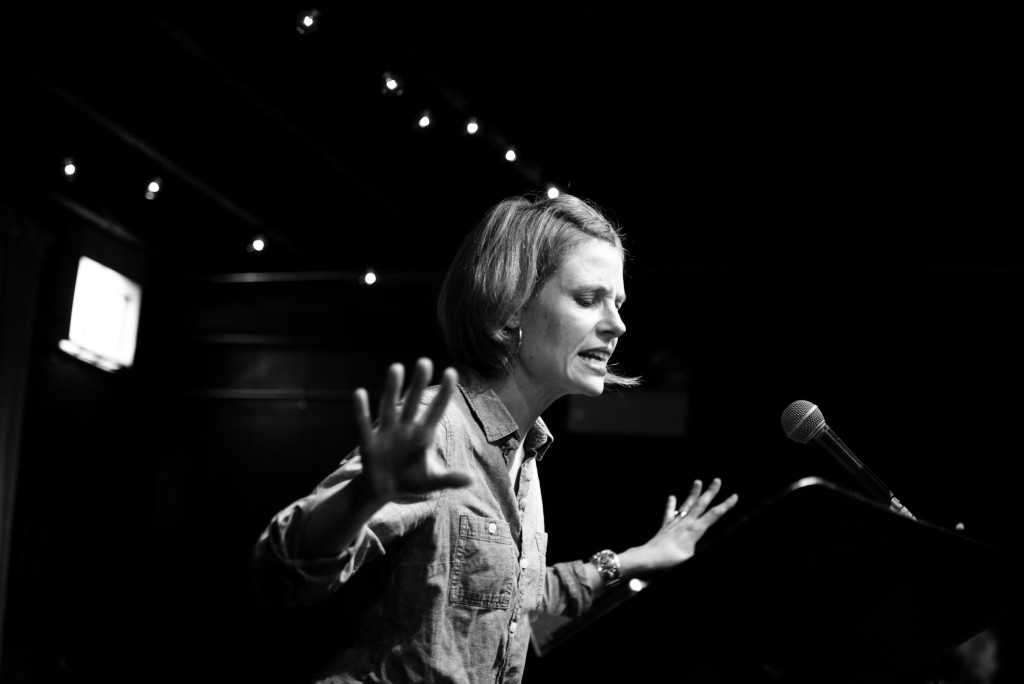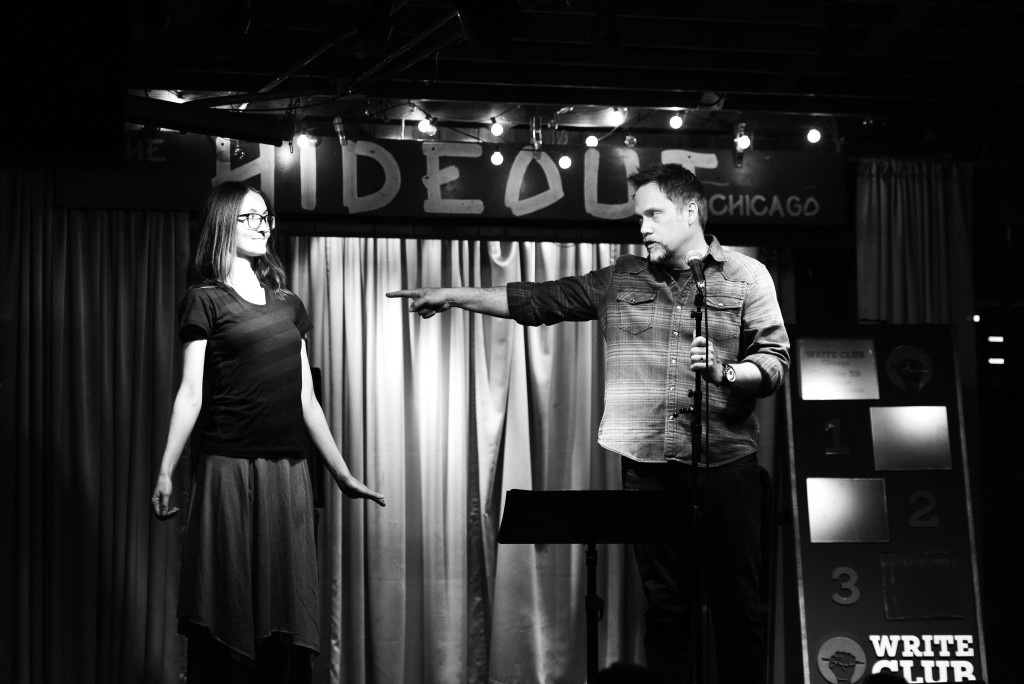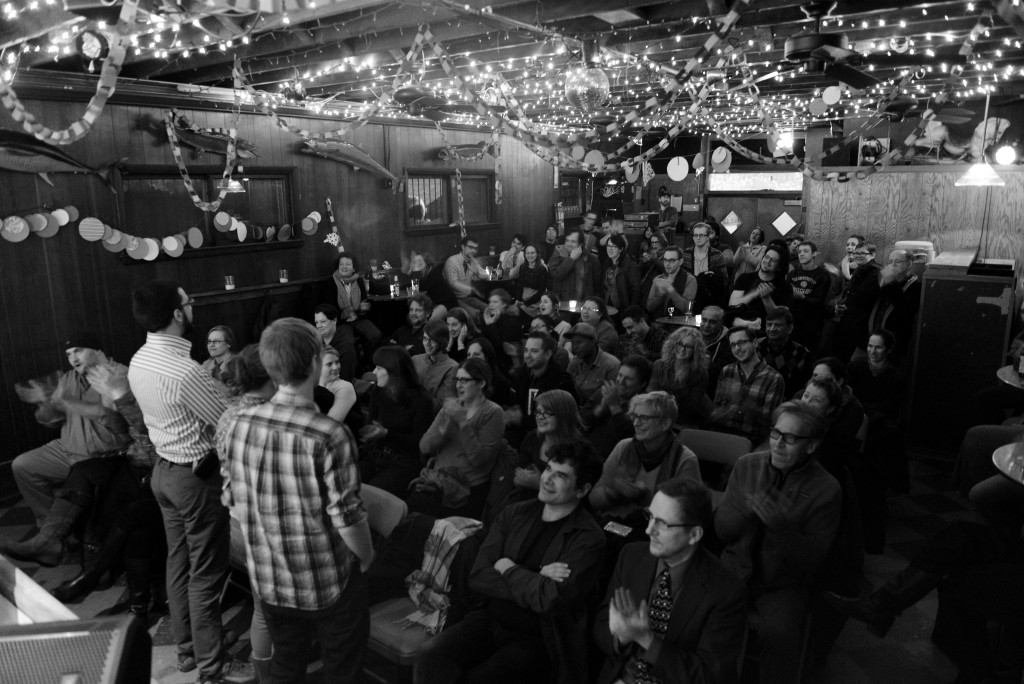
“Style note: it’s ‘Write Club’ not ‘The Write Club,’” I was corrected in the first 10 seconds of a recent phone conversation with Ian Belknap, the overlord and founder of the monthly live lit competition, for whom style is everything. In his Write Club empire, Ian creates a brand both self-parodying and inviting that is rapidly spreading, from Chicago to San Francisco to Atlanta and Toronto. Having seen the show once in Chicago and once in SF, I chatted with Ian and his whimsical producer Lindsay Muscato to discuss their upcoming book event in SF, branding, and the role of judgment, intentional or not, when we consume literature.
If you were thinking it’s merely a cute coincidence that Write Club sounds like Fight Club, you underestimate how “brutally competitive” Write Club is. The structure of each Write Club competition is just how you’d expect a contest devised by people who don’t play sports to be: Straightforward. Each writer competes onstage against one other writer. It works like a boxing match. There are three rounds. Each writer has been given a prompt ahead of time. Working with opposing themes like blessing and curse, reap and sow, light and dark, the writers have seven minutes to perform their essay or short story or poem or list. Whoever gets the most claps from the audience wins, as confirmed by the judges. No mercy rounds or second chances. This structure, Ian says, has been in place since the dawn of Write Club about five years ago. It’s the spine of the show; they keep it because it works.
Write Club didn’t invent this idea of using forced stakes to provoke audience investment. “Any sporting event is a zero-real-world stakes endeavor,” Ian reflects. “But regular humans get rabidly involved in the outcome.” He maps that logic onto Write Club, too. I wouldn’t personally have chosen the word rabid to describe the audience at Write Club either time I went. The crowd was too sprinkled with Warby Parker frames, flannel shirts, and PBRs for that. But I do see how the made-up stakes of a sporting contest force audiences to stay active in the performance space. Lindsay, a self-described hater of all things competitive and sports-related, explained that the contest element of Write Club is fun even for people like her, since its format “alleviates all possibility of hating your life while sitting in a show that is going on too long.” An active critic of boring poetry readings, Ian is wary of shows that take him down the road to “boring-town.” Ian’s way to keep things dynamic is to force the audience pick the winner.
Ian scoffs at the thought of celebrity judges, so he loves forcing one or two audience-members to pick winners. At the start of the last Write Club show I attended, the host asked who in the 25-person audience was not there to see a friend or loved one. Thinking nothing of it, my two friends and I raised our hands. After a few seconds of silence, penetrated by some uncomfortable giggles, we realized that we were the only people in the audience raising our hands. We were literally the only objective members of the audience who hadn’t come in favor of one performer. Before letting the implications of what that would mean for the event set in, we were named the judges for the evening. So when the audience clapped after each performance, we had to judge which writer had gotten more claps. We were transformed that night into human applause-o-meters.
At first, I was uncomfortable thinking that I had the power to make or ruin someone’s Write Club experience. In a competition setting, I didn’t want to be harbinger of failure. I felt bad making calls that could influence a struggling writer’s self-esteem. When I expressed that qualm to Ian later, he reassured me that making judgments with so little criteria is part of the fun of Write Club. “That capacity to develop this instantaneous wisdom that a crowd actually has” when forced to make a value judgment in a moment thrills him. It’s electrifying, joining everyone into the room to one outcome. Even though I was “officially” the judge, everyone in the room claps and cheers for their favorite writer, thus taking part in the judging process.
The kind of great thing about it is that winning in Write Club is meaningless in real-world terms. Each writer gets to rock out onstage and get immediate (usually positive feedback). The collegial atmosphere amidst purported “bloodsport competition” unites the writers, judges, and friends in the space. This happens without, Lindsay points out, being one of those “touchy-feely hippie-dippy” affairs live poetry shows can become. Ian reckons, in his years of watching and performing in Write Club shows, that the pieces with the most literary merit win. It just happens that the audience makes that decision.

While interested in presenting engaging shows, Ian and Lindsay are primarily dedicated to making Write Club a literary, not performing, enterprise. Write Club has nonetheless struggled to find its place in the literary world. Ian blames snobbery on the part of the broadly cast “literary world;” people think that, since authors in Write Club perform, their work has less literary merit. Ian got pretty worked up about this when we talked. His gruff voice, kind but edged with wry sarcasm, escalated as he bemoaned the fact that Write Club is considered less legitimate or important than purely text-based ventures.
So, to prove Write Club’s literary prowess to the wider world, Ian and Lindsay are putting out a new book, Bare-Knuckled Lit, sharing highlights of the best writing Write Club has had to offer since it began in 2010. The book, short but packed with moving, engaging pieces from the Chicago, Atlanta, and SF branches of Write Club, will introduce potential Write Club fans to the writing diverse combatants produce. The book proves, for Ian, that the writing Write Club performers do is deserving of recognition on its own.
Bare-Knuckled Lit opens with an acerbic introduction from Ian. Writing as the self-titled “overlord” of Write Club, he maintains a tongue-in-cheek, aggressively competitive tone reminiscent of a high school basketball coach. Samantha Irby, the zany author of, among other things, a blog entitled “bitchesgottaeat” also writes a forward to the book. These openers are so packed with sports talk and references to getting day-night drunk at the shows (not like, drunk drunk, but drunk for a Tuesday night writing show) that I was pumped to jump into the essays. I was not disappointed.
Unlike the sentimental content you might expect from an anthology of performed writing, the writing in Bare-Knuckled Lit is crisp, daring. Ian and Lindsay intentionally compiled a small but diverse selection of pieces. Each is presented opposite its competitor’s piece. I actively wondered which pieces I would have chosen as winners had I seen them performed live. Not intended as a replacement for the live shows, Bare-Knuckled Lit aims to whet readers’ appetites for Write Club events.
At the San Francisco show in November, the first topic was blessing vs. curse. A deadpan, swoopy-haired woman in jeans stood onstage and read a list on the topic of blessing. “I got laryngitis for three days and became a better listener #blessed” and “my girlfriend and I went to IKEA for the first time as a couple last weekend. And we are still a couple #blessed,” etc. Her opponent, on the topic of curse, told a detailed seven-minute anecdote about a time he bled out of his penis and didn’t know why. From there each round continued to puzzle and fascinate me. I found myself really wanting to be there to see who would take the stage next, who would win, and whether they’d bare too many personal details. Write Club is fun. Go with your friends. If you’ve ever gotten drowsy at a book talk or rolled your eyes at a poetry reading, Write Club is for you. If not, even better. You can be the judge, and I will see you there.
On January 19 at 7:30 pm, Booksmith, an independent bookstore in the Haight, is throwing a book release shindig for Bare-Knuckled Lit. Ian and Lindsay are coming in from Chicago for the event, and I’ll definitely be coming up from Stanford to check it out. Event details here: https://www.facebook.com/events/847901351920444/?ref_dashboard_filter=upcoming&sid_reminder=6647391935663177728
Write Club: http://www.writeclubnation.com
Book: http://www.writeclubnation.com/book/
Book release event: http://www.booksmith.com/event/writeclub-bare-knuckled-lit-best-write-club
Photos from The Hideout in Chicago, courtesy of Evan Hanover.

